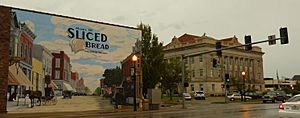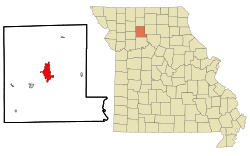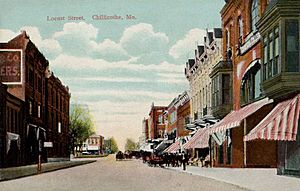Chillicothe, Missouri facts for kids
Quick facts for kids
Chillicothe, Missouri
|
|
|---|---|

Livingston County Courthouse with mural depicting the community being the home of sliced bread. The district around the courthouse is on the National Register of Historic Places.
|
|
| Nickname(s):
Chilli; Home of Sliced Bread; The Highway City
|
|

Location of Chillicothe, Missouri
|
|
| Country | United States |
| State | Missouri |
| County | Livingston |
| Town (Large) | March 1st, 1855 |
| Government | |
| • Type | Township |
| Area | |
| • Total | 7.16 sq mi (18.54 km2) |
| • Land | 7.13 sq mi (18.48 km2) |
| • Water | 0.03 sq mi (0.07 km2) |
| Elevation | 774 ft (236 m) |
| Population
(2020)
|
|
| • Total | 9,107 |
| • Density | 1,276.74/sq mi (492.93/km2) |
| Time zone | UTC-6 (Central (CST)) |
| • Summer (DST) | UTC-5 (CDT) |
| ZIP code |
64601
|
| Area code(s) | 660 |
| FIPS code | 29-13690 |
| GNIS feature ID | 2393517 |
| Website | www.chillicothecity.org |
Chillicothe is a city in Livingston County, Missouri, United States. It is the county seat, which means it's where the main government offices for the county are located. In 2020, about 9,107 people lived here. The name "Chillicothe" comes from the Shawnee language and means "big town." The city is also famous for being "The Home of Sliced Bread."
Contents
History of Chillicothe
Long ago, this area was home to different indigenous peoples (Native American tribes). The Osage and Missouri tribes lived here when the first European explorers arrived. Later, the Shawnee and Iowa tribes moved into the area. The Shawnee had a large village called Chillicothe near where the city is today. This village was named after their traditional capital in Ohio.
European-American settlers began moving to Missouri in the early 1800s. The first official survey of Chillicothe was done in 1837. The city officially became a city on March 1, 1855. It was chosen as the county seat, and the first county court meeting happened in May 1838.
Early buildings in Chillicothe were simple wooden houses. They were made from oak and walnut trees that grew around the town. Things started to change when the Hannibal & St. Joseph Railroad was finished in 1859. The railroad helped the town grow, and soon, two and three-story brick buildings replaced the old wooden ones.
From 1865 to 1870, the city grew quickly. Then, in 1875, a new school building was started, which is now known as "Middle School." Chillicothe continued to grow steadily. In 1886, the Chicago, Milwaukee & St. Paul Railroad came through town. That same year, the city got "Water Works" (a system for water supply) and electric lights, making it more modern.
Railroad Connections
Chillicothe was an important stop on the first railroad that crossed Missouri. This railroad was completed on February 13, 1859, by the Hannibal and St. Joseph Railroad. Later, it became part of the Chicago, Burlington and Quincy Railroad. Another railroad, the Wabash Railroad, reached Chillicothe in 1871.
Passenger trains served Chillicothe for over 100 years. However, the last passenger train left Chillicothe in 1971. The old train depot from 1909 was sold in 2016 and became a restaurant, but it has since closed.
The Missouri Training School for Girls
The Missouri Training School for Girls was a special facility for young women. It opened in 1889 and closed in 1981. In 1956, it also became home to all the African-American girls after another similar school closed.
Geography and Climate
Chillicothe is located in the middle of Livingston County. The Grand River flows about a mile south of the city. The Thompson River joins the Grand River about three miles southwest. Major roads like U.S. Route 36, U.S. Route 65, and Missouri Route 190 serve the city.
The city covers about 7 square miles (18 square kilometers). Most of this area is land, with a very small part being water.
Climate
| Climate data for Chillicothe 2S, Missouri (1991–2020 normals, extremes 1980–present) | |||||||||||||
|---|---|---|---|---|---|---|---|---|---|---|---|---|---|
| Month | Jan | Feb | Mar | Apr | May | Jun | Jul | Aug | Sep | Oct | Nov | Dec | Year |
| Record high °F (°C) | 74 (23) |
77 (25) |
86 (30) |
93 (34) |
98 (37) |
108 (42) |
110 (43) |
109 (43) |
100 (38) |
95 (35) |
81 (27) |
75 (24) |
110 (43) |
| Mean maximum °F (°C) | 59.0 (15.0) |
65.3 (18.5) |
77.3 (25.2) |
84.1 (28.9) |
89.6 (32.0) |
94.4 (34.7) |
98.2 (36.8) |
97.7 (36.5) |
92.1 (33.4) |
85.7 (29.8) |
73.7 (23.2) |
62.9 (17.2) |
99.9 (37.7) |
| Mean daily maximum °F (°C) | 34.5 (1.4) |
39.8 (4.3) |
52.0 (11.1) |
63.5 (17.5) |
73.5 (23.1) |
83.1 (28.4) |
87.3 (30.7) |
85.7 (29.8) |
78.3 (25.7) |
66.1 (18.9) |
51.4 (10.8) |
39.2 (4.0) |
62.9 (17.1) |
| Daily mean °F (°C) | 25.4 (−3.7) |
30.2 (−1.0) |
41.4 (5.2) |
52.4 (11.3) |
63.3 (17.4) |
73.1 (22.8) |
77.2 (25.1) |
75.1 (23.9) |
66.7 (19.3) |
54.5 (12.5) |
41.3 (5.2) |
30.5 (−0.8) |
52.6 (11.4) |
| Mean daily minimum °F (°C) | 16.3 (−8.7) |
20.6 (−6.3) |
30.8 (−0.7) |
41.4 (5.2) |
53.2 (11.8) |
63.1 (17.3) |
67.1 (19.5) |
64.4 (18.0) |
55.1 (12.8) |
42.8 (6.0) |
31.2 (−0.4) |
21.7 (−5.7) |
42.3 (5.7) |
| Mean minimum °F (°C) | −3.1 (−19.5) |
2.0 (−16.7) |
12.0 (−11.1) |
27.7 (−2.4) |
39.3 (4.1) |
51.1 (10.6) |
57.4 (14.1) |
54.9 (12.7) |
40.6 (4.8) |
28.2 (−2.1) |
16.1 (−8.8) |
2.9 (−16.2) |
−7.7 (−22.1) |
| Record low °F (°C) | −20 (−29) |
−17 (−27) |
−6 (−21) |
11 (−12) |
31 (−1) |
44 (7) |
50 (10) |
41 (5) |
30 (−1) |
19 (−7) |
−9 (−23) |
−26 (−32) |
−26 (−32) |
| Average precipitation inches (mm) | 1.26 (32) |
1.80 (46) |
2.90 (74) |
3.75 (95) |
5.36 (136) |
5.21 (132) |
4.71 (120) |
4.61 (117) |
4.39 (112) |
3.22 (82) |
2.29 (58) |
1.69 (43) |
41.19 (1,047) |
| Average snowfall inches (cm) | 4.7 (12) |
4.5 (11) |
1.6 (4.1) |
0.3 (0.76) |
0.0 (0.0) |
0.0 (0.0) |
0.0 (0.0) |
0.0 (0.0) |
0.0 (0.0) |
0.0 (0.0) |
0.4 (1.0) |
2.4 (6.1) |
13.9 (34.96) |
| Average precipitation days (≥ 0.01 in) | 6.3 | 7.3 | 9.2 | 11.3 | 13.1 | 10.9 | 9.3 | 9.6 | 8.6 | 9.3 | 7.4 | 6.6 | 108.9 |
| Average snowy days (≥ 0.1 in) | 2.8 | 2.4 | 0.9 | 0.1 | 0.0 | 0.0 | 0.0 | 0.0 | 0.0 | 0.0 | 0.5 | 2.1 | 8.8 |
| Source: NOAA | |||||||||||||
People and Population
| Historical population | |||
|---|---|---|---|
| Census | Pop. | %± | |
| 1860 | 994 | — | |
| 1870 | 3,978 | 300.2% | |
| 1880 | 4,078 | 2.5% | |
| 1890 | 5,717 | 40.2% | |
| 1900 | 6,905 | 20.8% | |
| 1910 | 6,265 | −9.3% | |
| 1920 | 6,772 | 8.1% | |
| 1930 | 8,177 | 20.7% | |
| 1940 | 8,012 | −2.0% | |
| 1950 | 8,694 | 8.5% | |
| 1960 | 9,236 | 6.2% | |
| 1970 | 9,519 | 3.1% | |
| 1980 | 9,089 | −4.5% | |
| 1990 | 8,804 | −3.1% | |
| 2000 | 8,968 | 1.9% | |
| 2010 | 9,515 | 6.1% | |
| 2020 | 9,107 | −4.3% | |
| U.S. Decennial Census | |||
How Many People Live in Chillicothe?
In 2020, the 2020 United States census counted 9,107 people living in Chillicothe. There were 3,608 households, which are groups of people living together.
Most people in Chillicothe are white (about 90.6%). About 3.4% are black or African-American, and smaller numbers are Native American, Asian, or from other backgrounds. About 2.3% of the population is Hispanic or Latino.
Families and Age Groups
About 27.5% of households in Chillicothe have children under 18. Many households (40%) are married couples. About 35.5% of households are people living alone.
The average age in the city is about 38.8 years old. About 18.9% of the people are under 18. About 20.1% are 65 years old or older.
Education in Chillicothe
The Chillicothe R-II School District provides education for students from preschool all the way through 12th grade. They also offer other learning programs.
- Schools for all ages:
- Chillicothe Early Learning Center (Preschool)
- Chillicothe Elementary School (Kindergarten to 5th grade)
- Chillicothe Middle School (6th to 8th grade)
- Chillicothe High School (9th to 12th grade)
- Other learning places:
- Hornet Academy
- Grand River Technical School
- Litton Agri-Science Learning Center
There is also a private school called Bishop Hogan Memorial School for students from preschool to 8th grade.
Libraries
Chillicothe has two libraries for everyone to enjoy:
- The Livingston County Library is a general lending library.
- The Lillian DesMarias Youth Library is especially for children and young people.
Media in Chillicothe
Chillicothe has its own local media to keep residents informed:
- The Chillicothe Constitution-Tribune is the local newspaper, started in 1889.
- KCHI Radio has two stations: KCHI-AM on 1010 kHz and KCHI-FM on 102.5 MHz.
- KRNW Radio (88.9 FM) broadcasts programs from Northwest Missouri State University.
- KULH Radio (105.9 The Wave) is a Christian radio station.
Notable People from Chillicothe
Many interesting people have come from Chillicothe, including:
- Moses Alexander, who became the 11th governor of Idaho.
- Joel Funk Asper, a US Congressman.
- Courtney W. Campbell, another congressman.
- Jerry Litton, also a congressman.
- Shirley Collie Nelson, a country music artist and actress.
- Shawn Ryan, a podcaster.
- William Y. Slack, a general during the Civil War.
See also
 In Spanish: Chillicothe (Misuri) para niños
In Spanish: Chillicothe (Misuri) para niños
 | Kyle Baker |
 | Joseph Yoakum |
 | Laura Wheeler Waring |
 | Henry Ossawa Tanner |


